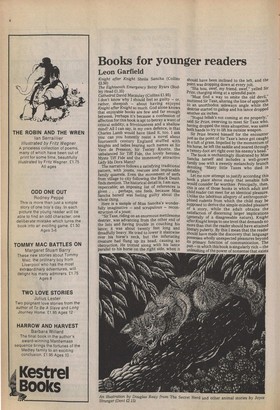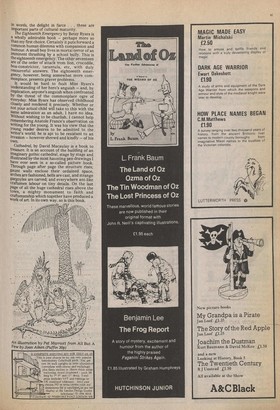Books for younger readers
Leon Garfield
Knight after Knight Sheila Sancha £2.50) The Eighteenth Emergency Betsy Byars (Bodley Head £1.35)
Cathedra/ David Macaulay (Collins £1.95)
I don't know why I should feel so guilty — or, rather, sheepish — about having enjoyed Knight after Knight so much. God alone knows that enjoyable books are few and far enough between. Perhaps it's because a confession of affection for this book is apt to betray a want of critical solidity, a frivolousness and a shallow mind? All I can say, in my own defence, is that Charles Lamb would have liked it, too. I ask you: can you honestly resist a novel about fourteenth century England stuffed with knights and ladies bearing such names as Sir Vere de Pression, Sir Tenley Knotte, the unbalanced Sir Tiff Fide, the lovely heroine, Myste Tiff Fide and the immensely attractive Lady Ida Dora Mann? The narrative follows a satisfying traditional pattern, with jousts, rescues and implacable family quarrels. Even the movement of serfs from village to city following the Black Death finds mention. The historical detail is, Jam sure, impeccable; an imposing list of references is given . . . perhaps, one feels, because Miss Sancha herself was feeling guilty about the whole thing. Here is a sample of Miss Sancha's wonderfully imaginative — and scrupulous — reconstruction of a joust: "Sir Taxe, riding on an enormous mettlesome destrier, was advancing from the other end of the lists and having trouble in couching his lance; it was about twenty feet long and dreadfully heavy. He tried to lower it slantwise over his horse's neck, but the infuriating creature had flung up its head, causing an obstruction. He trotted along with his lance parallel to his horse on the right side, when it should have been inclined to the left, and the point was dropping down at every jolt. "Sha hou, swef, my friend, swef," yelled Sir Prize, charging along at a splendid pace. "Must find a way to smite the old devil," muttered Sir Taxe, altering the line of approach to an unorthodox sideways angle while the destrier started to gallop and his lance dropped another six inches.
"Stupid fellah's not coming at me properly, said Sir Prize, swerving to meet Sir Taxe who, having dropped the reins altogether, was using both hands to try to lift his outsize weapon. Sir Prize braced himself for the encounter just as the point of Sir Taxe's lance got caught in a tuft of grass. Impelled by the momentum of his horse, he left the saddle and soared through a twenty-foot arc right over his enemy's head.'' The book is enchantingly illustrated by Miss Sancha herself and includes a well-grown family tree with a sweetly melancholy branch denoting "Many little Taxes who died in infancy."
Let me now attempt to justify according this book a place above many that sensible folk would consider far worthier. Principally, then, this is one of those books in which adult and child reader can meet for an identical pleasure. Unlike the labdrious allegory of anthropomorphised rodents from which the child may be supposed to derive the simple-minded pleasure of a story, while the adult obtains the satisfaction of discerning larger implications (generally of a disagreeable nature), Knight after Knight keeps to one level that demands no more than that the reader should have attained literary puberty. By this I mean that the reader should have made the discovery that language possesses wholly unexpected pleasures beyond its primary function of communication. The Pun — in which this book is singularly rich — the Unleashing of the power of nonsense that exists
in words, the delight in farce . . . these are important parts of cultural maturity. The Eighteenth Emergency by Betsy Byars is a wholly admirable book — perhaps more so than my first choice. Certainly it puts forward a common human dilemma with compassion and humour. A small boy lives in mortal terror of an imminent thrashing by a school bully. This is the eighteenth emergency. The other seventeen are of the order of attack trom lion, crocodile, boa-constrictor, tarantula, etc, with duly resourceful answers. The eighteenth emergency, however, being somewhat more commonplace, presents graver problems. It would be hard to fault Miss Byars's understanding of her hero's anguish — and, by implication, anyone's anguish when confronted by the threat of the commonplace ogre of everyday. Miss Byars has observed childhood Closely and rendered it precisely. Whether or not your actual child will take to this with the same admiration as an adult, I have no idea. Without wishing to be churlish, I cannot help remembering Anatole France's observation on writing for the young. It was his view that the Young reader desires to be admitted to the writer's world; he is apt to be resistant to an invasion — however shrewd and kindly — of his own, Cathedral, by David Macaulay is a book to treasure. It is an account of the building of an imaginary gothic cathedral, stage by stage and illustrated by the most haunting pen drawings I have ever seen in a so-called picture book. Through page after page the structure rises; gaunt walls enclose their ordained space, arches are fashioned, bells are cast, and strange gargoyles are carved; and everywhere ant-like craftsmen labour on tiny details. On the last Page of all the huge cathedral rises above the town, a mighty monument to faith and Craftsmanship which together have produced a work of art. In its own way, so is this book.



































































 Previous page
Previous page